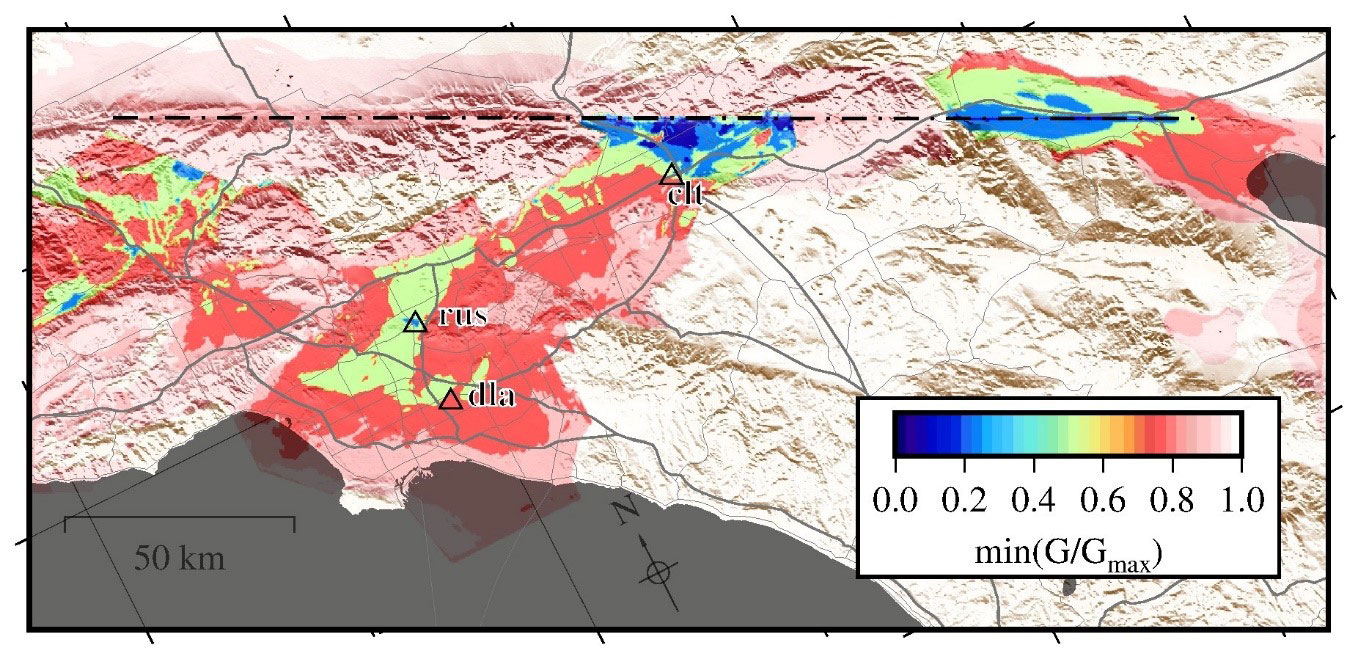

 Skip to navigation
Skip to navigation
Site Primary Navigation:
- About SDSC
- Services
- Support
- Research & Development
- Education & Training
- News & Events
Search The Site:

Published November 8, 2022

Map showing nonlinear surface effects in southern California during a M7.8 earthquake on the southern San Andreas fault. The shear modulus, a measure of the amount of force that will shear or twist a rock, is strongly reduced in green and blue areas, leading to reduced intensity of shaking. Simulation carried out with AWP-ODC, including Iwan nonlinearity, on TACC Frontera (Large-scale Community Partnership allocation through NSF OAC-1818253). Credit: Daniel Roten, SDSC
By Cynthia Dillon, SDSC External Relations
The San Diego Supercomputer Center (SDSC) at UC San Diego in collaboration with the Southern California Earthquake Center (SCEC) is hosting a new oneAPI Center of Excellence. The center’s focus is to address the challenges of numerically simulating the dynamics of fault rupture and seismic ground motion in realistic 3D models. It will do this by optimizing an award-winning open-source simulation code using oneAPI, which features cross-architecture programming to create portable, high-performance multiarchitecture code for advanced high-performance computing systems.
SCEC researchers have extensively applied the award-winning simulation code known as Anelastic Wave Propagation – Olsen, Day, Cui (AWP-ODC), developed at SDSC in collaboration with San Diego State University and the University of Southern California, to enable computational productions from standard “forward” simulations (computing three-component seismograms – records of earthquake phenomena) to multiple-source “reciprocal” simulations (calculating seismic hazard estimates for sites of interest). The computational outcomes allow for ground motion predictions that help decision-makers reduce seismic risk by improving building codes and increasing community resilience to earthquake hazards.
“The goal of this project is to continue our successful collaboration with Intel to get this state-of-the-art seismic wave propagation code updated to support multivendor and multiarchitecture systems for heterogeneous computing,” said Yifeng Cui, SCEC Board of Directors member and founding director of the High Performance GeoComputing Lab at SDSC. “We want to provide a programming-friendly environment for exascale earthquake simulations on upcoming leadership class systems – high-end computers that are among the most advanced in the world for solving scientific and engineering problems.”
Simulation of M9 megathrust earthquake in the Cascadia subduction zone. Red and blue colors show ground velocity in E-W direction, and green colors show permanent plastic deformation. In this scenario, the hypocenter is off the coast of Oregon, and the rupture propagates towards the north, sending long-period ground motions towards Seattle and Vancouver. The animation also shows seismograms being recorded at a few selected locations. The simulation was carried out on the Summit/Titan supercomputer, the visualization on Rhea, both at Oak Ridge Leadership Computing Facility supported by DOE AC05-00OR22725. Credit: Daniel Roten, SDSC
Technical aspects of this project include using oneAPI’s open, standards-based, unified programming for CPUs and accelerators such as GPUs for fast application performance, more productivity and greater innovation to run exascale earthquake simulations. Among other functions, the optimized AWP-ODC will be used for continued open geoscience collaboration worldwide for R&D in HPC, data-intensive computing and grid computing to develop applications supporting extreme-scale earthquake simulation.
“SCEC has partnered with SDSC for nearly 20 years, creating increasingly realistic simulations of earthquake phenomena that provide new insights to scientists, guide risk reduction and motivate the public to prepare,” said Yehuda Ben-Zion, SCEC director. “The exascale simulations that will be made possible by the oneAPI Center of Excellence will advance significantly our work and the outcomes we can achieve.”
Co-principal investigators of this Center of Excellence are Philip Maechling, associate director for Information Technology at SCEC, and Daniel Roten, a computational data scientist at SDSC.
“This oneAPI Center’s work enabling Anelastic Wave Propagation and 3D modeling on multiarchitecture systems using oneAPI will advance earthquake and seismic hazard analysis. Intel is looking forward to the new insights this will provide to better prepare the world for these critical events,” says Scott Apeland, senior director of Intel Developer Ecosystem Programs. “This expands the exciting work that our oneAPI Centers of Excellence around the world are achieving with productive, performant heterogeneous computing by contributing research, code optimizations, and training programs to accelerate oneAPI adoption.”
SDSC was recently recognized as a Core Institution of the SCEC Consortium – the largest research collaboration in geoscience – with both institutions committed to continued support and maintenance of AWP-ODC code development.
oneAPI is an open, unified and cross-architecture programming model for CPUs and accelerator architectures (GPUs, FPGAs, and others). Based on standards, the programming model simplifies software development and delivers uncompromised performance for accelerated compute without proprietary lock-in, while enabling the integration of existing code. With oneAPI, developers can choose the best architecture for the specific problem they are trying to solve without needing to rewrite software for the next architecture and platform.
Share